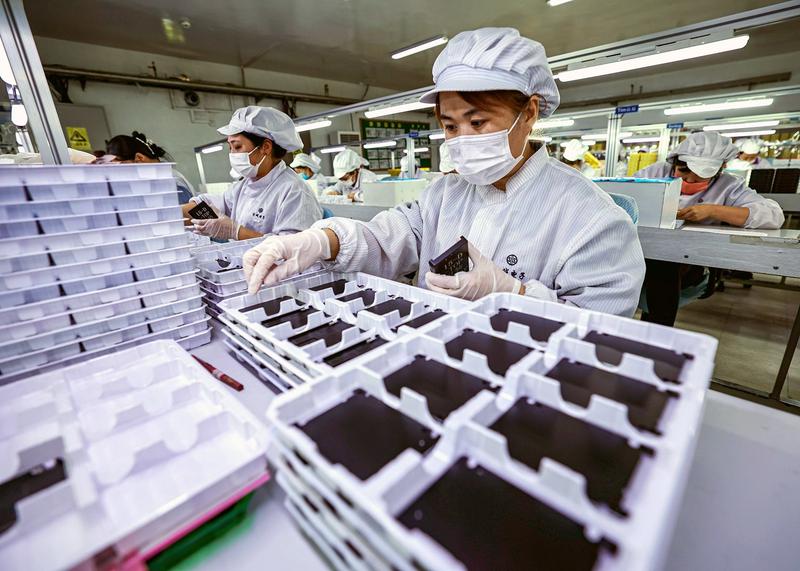Amid headwinds, Jan-May data up 17% y-o-y on resilience, growth hopes
 Employees work on the production line of a foreign-funded electronics manufacturing company in Rongcheng, Shandong province. (LI XINJUN / FOR CHINA DAILY)
Employees work on the production line of a foreign-funded electronics manufacturing company in Rongcheng, Shandong province. (LI XINJUN / FOR CHINA DAILY)
China's huge economy, its bright prospects and the government's unwavering efforts to open the domestic market wider to the rest of the world make the country increasingly attractive to foreign investors, despite the impact of COVID-19 resurgence and rising protectionism in some countries, experts and business leaders said on Tuesday.
Their assessment followed a review of the latest data on the actual use of foreign capital, which surged 17.3 percent year-on-year to 564.2 billion yuan ($83.78 billion) in the first five months of the year.
In US dollar terms, the investments were even higher at $87.77 billion, up 22.6 percent year-on-year, latest data from the Ministry of Commerce showed on Tuesday.
The actual use of foreign capital in the services sector grew by 10.8 percent year-on-year to 423.3 billion yuan, the ministry said in an online statement, adding the growth rates of high-tech industries, high-tech manufacturing and high-tech services were 42.7 percent, 32.9 percent and 45.4 percent, respectively.
"Those figures have again showed foreign investors' strong confidence in China," said Zhou Mi, a senior researcher at the Chinese Academy of International Trade and Economic Cooperation in Beijing.
"With a huge market that's growing, the Chinese economy is upgrading through better coordination among regions and industries. Its strong capability to continuously coordinate the growth in the consumption, production and services sectors makes it distinctive and always attractive to foreign investors."
Nie Pingxiang, deputy director of the Service Trade Institute, which is part of the CAITEC, said the sustained rise in China's actual use of foreign capital is attributable to economic resilience and promising growth potential despite the resurgence of COVID-19 cases.
More inflow of foreign direct investment into the high-tech sector is testimony to the improvement of China's FDI structure. More multinational companies now invest in China's high-tech sector, thanks to acceleration of the industrial upgrade process and pursuit of the dual-circulation development model, Nie said.
China's dual-circulation paradigm takes the domestic market as the mainstay while encouraging the domestic and foreign markets to reinforce each other.
Nie also stressed China's attractiveness to foreign investors is not only stable but immune to the negative impact from political factors to a large extent.
MOC data showed investments from South Korea, the United States and Germany rose sharply during the first five months of the year, with the respective year-on-year growth rates hitting 52.8 percent, 27.1 percent and 21.4 percent.
Some media reports said the US Congress is pressing ahead with a legislation that could rewrite the rules for US companies investing abroad, proposing the screening of investments in countries like China seen as adversaries. Zhou of the CAITEC said such a proposal violates the spirit of the rules and policies for protecting property rights, an area where the US brags its record is impeccable.
Screening of outbound investments of US enterprises will interfere with their decisionmaking, disrupts normal business of enterprises, undermines their efficiency and commercial outcomes, and ultimately hurts the interests of not only the FDI destination nations but the US itself.
Alfonso Alba, Germany-headquartered Bayer Crop Science's country division head in China, said the company is very optimistic about the China market.
Bayer Crop Science has made an ambitious development plan in China for the next 10 years and already signed up for the fifth China International Import Expo scheduled to be held in November in Shanghai. A factory located in a district of Hangzhou, Zhejiang province, will be expanded, after relocating it to another site.
"We are happy China has rolled out various high-level opening-up measures. China offers us ample development opportunities, and thanks to the nation's lead in the digital economy, we are also able to explore more possibilities in digital agriculture," he said.
Jeremy Yeo, acting general manager in China of the US plant-based meat company Beyond Meat, said the company sees significant potential in the China market, and will step up investment.
The company opened a new manufacturing facility in Jiaxing, Zhejiang province, in 2021. It is its first end-to-end manufacturing facility outside the US, and is expected to significantly increase the speed and scale of producing and distributing products in China while also improving the cost structure and sustainability of operations.


